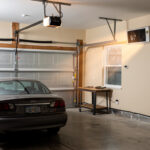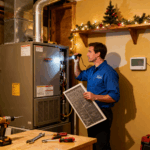
How to Keep Your Home Warm Without Sky-High Heating Bills
As temperatures drop, heating bills often rise and for many homeowners, winter can bring sticker shock when the utility bill
Getting a good night’s sleep is essential for your health, mood, and productivity. But did you know your HVAC system can play a big role in how well you sleep? From the temperature in your bedroom to the air quality and noise level, your heating and cooling system directly impacts how comfortable and restful your nights are. Understanding this connection can help you make small adjustments that lead to deeper, healthier sleep.
One of the biggest ways your HVAC system affects your sleep is through temperature control. Studies show that most people sleep best in a slightly cool environment, usually between 60°F and 67°F. When your bedroom is too hot or too cold, it disrupts your body’s natural ability to regulate temperature, making it harder to fall and stay asleep.
If your air conditioner struggles to maintain a consistent temperature, you might wake up sweaty in the middle of the night or find yourself shivering under the blankets. Uneven temperatures can also occur if your HVAC system isn’t properly balanced or your thermostat is outdated.
A programmable or smart thermostat can make a big difference here. It allows you to automatically lower the temperature when it’s time for bed and raise it slightly before you wake up helping your body follow its natural sleep cycle while also saving energy.
Humidity is another factor that influences sleep quality. Too much humidity can make the air feel heavy and sticky, causing discomfort and night sweats. Too little humidity, on the other hand, can lead to dry skin, irritated sinuses, and scratchy throats all of which can interrupt your rest.
Your HVAC system helps control indoor humidity, especially when it’s well-maintained. Air conditioners remove excess moisture from the air during the summer, while humidifiers can add moisture during the dry winter months. If your system isn’t keeping humidity levels in the ideal range of 30% to 50%, it may be time for a tune-up or to add a dedicated humidification system.
The quality of the air you breathe at night directly affects your sleep. Poor indoor air quality caused by dust, allergens, pet dander, or mold can trigger allergies, congestion, and coughing that disturb your rest. In some cases, airborne irritants can even cause or worsen sleep apnea symptoms.
Your HVAC system acts as the lungs of your home, circulating air throughout every room. When filters are clean and ducts are sealed, it can help reduce airborne particles and improve your overall air quality. However, if filters are dirty or neglected, your HVAC system can actually spread pollutants instead of filtering them out.
To breathe easier and sleep better, replace your air filters regularly usually every 1 to 3 months and consider upgrading to high-efficiency HEPA filters. You might also explore adding an air purification system to work alongside your HVAC unit, especially if you live in an area prone to dust, pollen, or poor outdoor air quality.
Even if your HVAC system is doing a great job maintaining temperature and air quality, excessive noise can still affect your ability to sleep soundly. A loud furnace, rattling ducts, or an air conditioner that frequently cycles on and off can interrupt your sleep cycles without you realizing it.
A well-maintained HVAC system should operate quietly in the background. If you notice loud humming, banging, or clanging, it could indicate loose components, worn belts, or airflow issues. Scheduling routine maintenance can help identify and fix these problems early restoring the peace and quiet you need for a restful night’s sleep.
Proper airflow ensures that cool or warm air reaches your bedroom evenly. Blocked vents, closed doors, or leaky ducts can lead to stuffy, stagnant air that makes your room uncomfortable. Poor circulation can also cause uneven temperatures from one room to another, forcing your HVAC system to work harder and wear out faster.
Make sure vents and registers are open and unobstructed by furniture or curtains. If you notice that your bedroom always feels warmer or cooler than the rest of your house, an HVAC professional can inspect your system for duct issues or recommend zoned heating and cooling, which gives you personalized temperature control in each area of your home.
Your HVAC system is more than just a way to stay warm in the winter and cool in the summer; it’s a key part of creating the perfect environment for quality sleep. By maintaining a comfortable temperature, balanced humidity, clean air, and quiet operation, you can turn your bedroom into a true sleep sanctuary.
If you’ve been tossing and turning at night, your HVAC system might be part of the problem and the solution. Schedule a maintenance check or indoor air quality evaluation with a trusted HVAC professional. With a few adjustments, you can enjoy better sleep, better health, and a more comfortable home year-round.

As temperatures drop, heating bills often rise and for many homeowners, winter can bring sticker shock when the utility bill

A garage heater is a game-changer during the colder months, keeping your workspace warm and comfortable. However, even the most

The holidays are a time for family, friends, and celebration but they can also put extra strain on your home’s